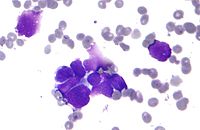
Photo from wikipedia
Background: Obesity is a risk factor for breast cancer development in women who carry a mutation in the DNA repair enzymes BRCA1 or BRCA2. Previously, we found that obesity was… Click to show full abstract
Background: Obesity is a risk factor for breast cancer development in women who carry a mutation in the DNA repair enzymes BRCA1 or BRCA2. Previously, we found that obesity was positively associated with DNA damage in breast epithelium from BRCA mutation carriers. Furthermore, factors secreted by obese breast adipose tissue stimulated DNA damage in BRCA mutant breast epithelial cells, suggesting a cross-talk between breast epithelial cells and the adipose tissue that surrounds them. We hypothesized that leptin, a hormone secreted in abundance by obese adipose tissue, may be a driver of DNA damage and/or decrease capacity for DNA repair in breast epithelial cells. If true, this would provide a molecular target for intervention to reduce the risk of tumor formation in this high-risk population of women. Methods: RNA-seq followed by Ingenuity Pathway Analysis (IPA) was conducted on primary breast epithelial organoids isolated from lean and obese BRCA mutation carriers. Breast adipose tissue obtained from lean and obese women were cultured as explants for 24 hours to produce lean and obese conditioned media (CM). The effect of leptin on DNA damage was assessed in a non-cancerous breast epithelial cell line (MCF10A) carrying a heterozygous BRCA1 mutation. Immunofluorescence staining of the DNA damage marker ƴH2AX was carried out after treatment with leptin (100ng-800ng), CM, or CM+leptin antibody, used to neutralize leptin. To test whether leptin affects DNA repair capacity, BRCA1+/- MCF10A cells were treated with leptin or vehicle and then irradiated (1Gy) to induce DNA damage. Resolution of damage was quantified at 0, 0.5, 4, 12, and 24 hrs post-irradiation. Results: IPA analysis identified leptin signaling as significantly upregulated in breast epithelial organoids from obese women compared with lean women. Both obese CM and leptin treatment induced DNA damage in BRCA1+/- MCF10A cells while lean CM did not have this effect. Neutralizing leptin in obese CM was sufficient to inhibit obese CM-mediated induction of DNA damage. No significant difference was observed between leptin or vehicle treatments on DNA repair capacity after irradiation of BRCA+/- MCF10A cells. Conclusions: These data identify leptin, an adipose-derived hormone, as a novel driver of DNA damage in breast epithelial cells. To date, no studies have elucidated the molecular mechanisms that explain the increased penetrance of breast cancer in obese BRCA mutation carriers compared to lean BRCA mutation carriers. This work suggests that leptin may be a mediator of the link between obesity and breast cancer development in this population. Further studies are warranted to determine if targeting the leptin signaling axis will be an effective risk reduction strategy in BRCA mutation carriers who have excess adiposity.
Journal Title: Journal of the Endocrine Society
Year Published: 2021
Link to full text (if available)
Share on Social Media: Sign Up to like & get
recommendations!